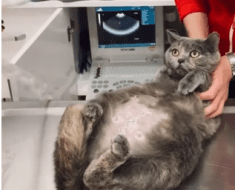Yes, cats can have seasonal allergies.
Seasonal Allergies In Cats
Cats can suffer from seasonal allergies, just like humans. Some common symptoms of seasonal allergies in cats include sneezing, coughing, itching, and watery eyes. These allergies are triggered by various environmental factors, such as pollen, grass, mold, and fleas. 
When it comes to identifying allergies in cats, it’s important to look out for excessive scratching, licking, biting, and rubbing of the body or face. Hair loss, inflamed skin, and ear infections may also indicate seasonal allergies in cats. Some common triggers for seasonal allergies in cats are pollen, mold spores, dust mites, and fleas. Outdoor allergens like grass and trees can also contribute to seasonal allergies in cats.
Diagnosing Seasonal Allergies In Cats
Seasonal allergies can affect cats, causing discomfort and health issues. To diagnose if your cat has seasonal allergies, a veterinary examination is vital. The veterinarian will conduct a comprehensive examination of your cat’s medical history and symptoms. They will ask you questions about the onset and duration of the symptoms, any patterns noticed, and potential environmental triggers. They may also perform a physical examination to rule out other possible causes of the symptoms. Allergy testing methods are commonly used to identify specific allergens affecting cats. These tests can include blood tests or skin-prick testing. Blood tests can determine the presence of specific antibodies to allergens, while skin-prick tests involve exposing the cat’s skin to potential allergens. With an accurate diagnosis, you can then work with your veterinarian to develop a suitable treatment plan to manage your cat’s seasonal allergies and ensure their well-being.
Treatment Options For Cats With Seasonal Allergies
Cats can experience seasonal allergies much like humans. Symptoms may include sneezing, itching, and watery eyes. It’s essential to consult a veterinarian to properly diagnose and treat your cat’s allergies. Medication options may include antihistamines or corticosteroids to manage symptoms. Environmental management involves minimizing exposure to allergens through regular cleaning and air purification. Additionally, discussing a diet plan with your vet can help strengthen your cat’s immune system. Overall, with proper care and attention, cats can lead a comfortable life, even with seasonal allergies.
Preventive Measures For Seasonal Allergies In Cats
To prevent seasonal allergies in cats, limit their exposure to allergens, keep their living area clean, use air purifiers, and groom them regularly. Monitor their symptoms and consult a veterinarian for the best treatment options. Regular check-ups can ensure your cat’s overall well-being.
| Preventive Measures for Seasonal Allergies in Cats |
| Reducing Exposure to Allergens |
| Clean your cat’s bedding regularly to remove allergens. |
| Keep your house dust-free to minimize allergen exposure. |
| Consider using an air purifier to filter out allergens. |
| Brush your cat regularly to remove loose fur and dander. |
| Visit the vet for allergy testing and treatment options. |
Lifestyle Impact On Cats With Seasonal Allergies
Cats can experience seasonal allergies like humans, impacting their quality of life. Allergy symptoms such as sneezing, itching, and watery eyes can affect multi-cat households. It is important to manage these allergies with proper medication and environmental modifications to ensure the well-being of your feline friends.
Frequently Asked Questions: Can Cats Have Seasonal Allergies?
Are seasonal allergies common in cats?
Seasonal allergies can affect cats. Symptoms include sneezing, itching, watery eyes, and skin issues.
What Are the Signs of Seasonal Allergies in Cats?
Look for signs like excessive scratching, redness, sneezing, and runny eyes to identify seasonal allergies in cats.
Can cats develop allergies to pollen?
Yes, cats can develop allergies to various allergens like pollen, dust, mold, and other environmental factors.
How Can I Help My Cat With Seasonal Allergies?
Provide a clean environment, regular grooming, limited outdoor exposure, and consult with a vet for proper treatment.
Is it necessary to visit a vet for cat allergies?
Consulting a vet is crucial to diagnose allergies accurately and determine the best treatment plan.
Conclusion
In considering whether cats can have seasonal allergies, it’s important to recognize the signs and symptoms they may exhibit. By understanding these, cat owners can take proactive steps to manage and treat their feline companions’ allergies, ensuring a healthier and happier life for the cats.
With proper care and attention, cats with seasonal allergies can thrive year-round.






One Comment